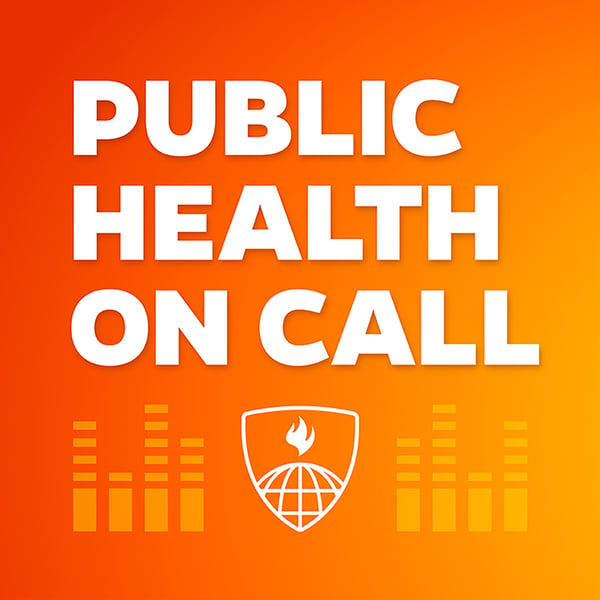917 - Why Some Moms Are Hesitant To Vaccinate
Public Health On Call
The Johns Hopkins Bloomberg School of Public Health
4.8 • 620 Ratings
🗓️ 9 July 2025
⏱️ 22 minutes
🧾️ Download transcript
Summary
About this episode:
For mothers questioning whether or not to vaccinate their children, the decision can be complicated by an overwhelming and, at times, conflicting information environment. In this episode: Health communication researcher Melissa Carrion explores how an onslaught of messaging is informing how mothers decide to vaccinate their kids and how public health experts can better communicate on these key decisions.
Guest:
Melissa Carrion, PhD, is an assistant professor of Writing and Rhetoric at the University of Nevada, Las Vegas, where she researches rhetoric and health communication.
Host:
Lindsay Smith Rogers, MA, is the producer of the Public Health On Call podcast, an editor for Expert Insights, and the director of content strategy for the Johns Hopkins Bloomberg School of Public Health.
Show links and related content:
-
How one mom is navigating vaccines’ uncertain future—ScienceNews
-
New Research: Childhood Vaccination Rates Drop Across 1,600 U.S. Counties—The 74
-
"I Don't Understand How These Two Things Go Together": Toward a Theory of Risk Ecologies—Health Communication
-
“You need to do your research”: Vaccines, contestable science, and maternal epistemology—Public Understanding of Science
Transcript information:
Looking for episode transcripts? Open our podcast on the Apple Podcasts app (desktop or mobile) or the Spotify mobile app to access an auto-generated transcript of any episode. Closed captioning is also available for every episode on our YouTube channel.
Contact us:
Have a question about something you heard? Looking for a transcript? Want to suggest a topic or guest? Contact us via email or visit our website.
Follow us:
-
Here's our RSS feed
Note: These podcasts are a conversation between the participants, and do not represent the position of Johns Hopkins University.
Transcript
Click on a timestamp to play from that location
| 0:00.0 | Welcome to Public Health On Call, a podcast from the Johns Hopkins Bloomberg School of Public Health, |
| 0:05.9 | where we bring evidence, experience, and perspective to make sense of today's leading health challenges. |
| 0:16.3 | If you have questions or ideas for us, please send an email to public health question at jh.h.u. |
| 0:22.6 | That's public health question at jh.u.edu for future podcast episodes. |
| 0:30.6 | Hey listeners, it's Lindsay Smith-Rogers. Today, health communication and rhetoric when it comes to maternal vaccine hesitancy. |
| 0:40.2 | Melissa Carion is a researcher and professor at the University of Nevada, Las Vegas, |
| 0:44.7 | and she talks with me about how the way we talk about health and medicine can influence our behavior |
| 0:51.5 | and her research looking at how mothers make decisions about vaccines for |
| 0:56.4 | their children. Let's listen. Melissa Carion, thank you so much for joining us on Public Health on |
| 1:01.7 | Call. How are you? I'm doing great. Thanks for having me here. Sure. So tell us a little bit about |
| 1:06.5 | your research. Sure. So I am an assistant professor in the Department of English at the University of |
| 1:12.4 | Nevada, Las Vegas, and I teach in research primarily in the areas of rhetoric and technical |
| 1:18.0 | communication, but especially health communication. I consider most of my work as kind of falling |
| 1:23.5 | within a subfield that we call the rhetoric of health and medicine. I'm really interested |
| 1:28.4 | in examining how the ways that we talk about health and medicine influence and shape the ways |
| 1:33.9 | that we think and make decisions about health and medicine. And by we, I'm talking not only about |
| 1:39.8 | health care professionals and quote-un unquote experts, but public discourse in |
| 1:45.0 | general, right? And by talk, I mean, not just like the conversations we have, but I mean kind |
| 1:49.4 | of communication more broadly, right? So everything from books to like the technical documents |
| 1:55.4 | and guidelines put out by institutional bodies, also things like popular culture, film and media, social media, |
| 2:03.0 | right, which is where obviously a lot of people are getting their information. This is sort of |
| 2:07.7 | putting rhetoric in the center of things, right? It's the idea that when we're communicating |
... |
Please login to see the full transcript.
Disclaimer: The podcast and artwork embedded on this page are from The Johns Hopkins Bloomberg School of Public Health, and are the property of its owner and not affiliated with or endorsed by Tapesearch.
Generated transcripts are the property of The Johns Hopkins Bloomberg School of Public Health and are distributed freely under the Fair Use doctrine. Transcripts generated by Tapesearch are not guaranteed to be accurate.
Copyright © Tapesearch 2025.

